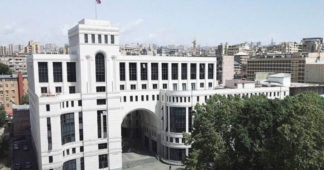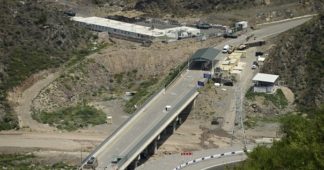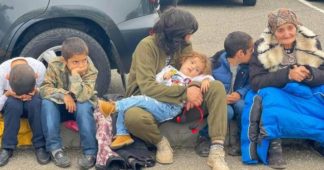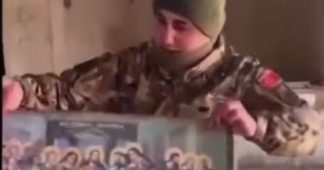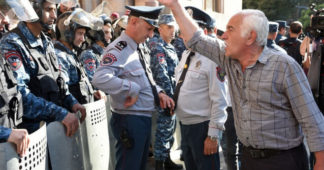Armenian community members unhappy about student foreign policy conference.
Armenian students and residents of Los Angeles, home to the largest Armenian diaspora, protested the presence of the U.S. Turkish Ambassador Hasan Murat Mercan at a foreign policy conference on campus Friday. The panel, “Role of Diplomacy in Turkish Foreign Policy” was initially open to all students, but became a high-security affair after protesters were forcibly thrown out of Wallis Annenberg Hall and access to the event was restricted.
Several dozen demonstrators held up signs with red handprints, chanting “USC supports terrorists,” and “genocidal policy has no place in diplomacy,” along with other phrases critical of the Turkish government. The protestors could be heard inside the conference room at the event, organized by students and held at the USC Annenberg School of Communication and Journalism.
Annenberg Dean Willow Bay said USC stands by its choice to hold the event due to their Policy on Free Speech at USC.
“We have certainly received emails expressing concerns about this event and asking us to cancel this event,” Bay said. “Our hearts go out to all our Armenian students.”
A video taken by one of the student protestors shows DPS officers escorting students out of the conference room. Once outside, DPS officers clashed with students trying to regain entry to the conference. The group of demonstrators was not limited to the USC Armenian Student Association, as members of the greater Los Angeles Armenian diaspora also joined the protest.
The protestors said they are outraged by recent events in the Lachin corridor, the only road connecting the Armenian population in the Nagorno-Karabakh region with their homeland. The road has been blocked by Turkish-supported Azerbaijani military forces, leaving hundreds wounded and dozens dead due to a lack of food, medicine and other essentials.
The Nagorno-Karabakh region, known by Armenians as the Republic of Artsakh, is in sovereign Azerbaijan. Over 93,000 ethnic Armenians have fled since Azerbaijan opened the Lachin corridor on September 24, after taking control of the region on September 20.
Last month, Luis Moreno Ocampo, former prosecutor of the International Criminal Court, said in a report that the blockade can be considered an act of genocide under Article II of the Geneva Convention. These events are eerily similar to the Armenian genocide of 1915 when the Ottoman Empire murdered and deported Armenians resulting in up to 1 million Armenian deaths.
Mercan addressed the conflict, “Everyone has [their] own narrative, I have my own narrative, the Armenians have [their] own narrative,” he said to Annenberg Media during the Q&A session of the conference.
USC student Lilia Margaryan joined the protest outside Annenberg Hall. “We’re trying to spread the message that Armenia needs to be recognized and understood,” she said. “The dissolving of Artsakh, which is also known as Nagorno-Karabakh, needs to get a lot more media coverage and it hasn’t been.”
The Armenian Youth Federation, in an Instagram post on September 26, said Mercan actively upholds the Turkish policy of Armenian genocide denial.
When Marcan was asked how he would address the protestors, he said, “On this issue of so-called genocide… labeling something as genocide is a legal term and that requires a legal process. That requires research and analysis of the history of all the archives… Then progress is made.”
Shant Kassabian, secretary of the Armenian Student Organization of USC, expressed that although he is unaware of the specifics of the legitimacy and legality of using the term, he and the Armenian community see history repeating itself from the 1915 genocide and thus label what is happening now as a genocide.
Mercan compared other historical events with the humanitarian crisis in Armenia.
“You know Jews went through a terrible Holocaust. They handled it differently… Each culture has its own way of handling its sorrow. I understand it, but we cannot reverse the history back,” he said. “So, if we are able to move forwards, like many Armenians living in Turkey, I think we will be able to create this.”
In response to Mercan’s statement, Kassabian said, “Imagine if the American government dropped two nuclear bombs on Nagasaki and Hiroshima, and then turned around and denied doing so. That’s our situation. Imagine Hitler going about committing atrocities throughout World War II and then the German government denying ever doing so.”
After the Armenian Student Association sent an email to the event organizer Robert D. Banks, director of the Master of Public Diplomacy Program, urging him to cancel the event, USC Annenberg responded with a statement saying, “We are committed to ensuring that our environment encourages and protects robust debate and inquiry.”
USC Gould School of Law student, Elizabeth Petrosyan initially hoped to be a part of legally resolving the conflict one day using her judicial degree. Now, she sees a peaceful resolution with Turkey as improbable.
“They preach hate. They instill hate into the new generations of their country,” she said.
Petrosyan also expressed disappointment with the university.”It’s difficult studying at a school that accepts this — it hasn’t even been a week,” she said, referring to the mass casualties in Armenia’s attempt to save Nagorno Karabakh earlier this week. “This is still going on. We have family members that we haven’t heard from in five days. We don’t know whether they’re alive. We don’t know where they are.”
Annenberg Hall was locked down most of the day, with students being turned away unless they had a class or an appointment in the Media Center. There was heavy police presence outside of the building, with the entrance still being blocked even after a TrojanAlert sent to students claimed the demonstration was concluded around 2 p.m.
We remind our readers that publication of articles on our site does not mean that we agree with what is written. Our policy is to publish anything which we consider of interest, so as to assist our readers in forming their opinions. Sometimes we even publish articles with which we totally disagree, since we believe it is important for our readers to be informed on as wide a spectrum of views as possible.
